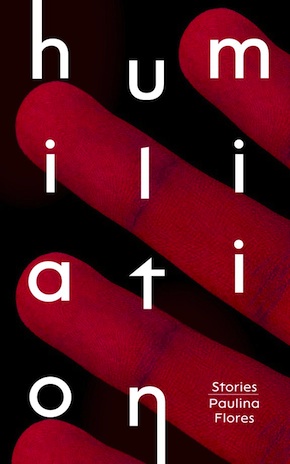American spirit
by Paulina Flores
“A brilliant book that captures the volatility of misunderstandings, the moment when failures matter less than the need to share them.” Alejandro Zambra
A couple of months ago, I met up with my friend Dorothy. We’d been very close back when we worked at Friday’s together, she as a bartender and I as a waitress, but we hadn’t seen each other in a long time. Maybe three years, since just after her son was born and I quit. She got in touch through Facebook and suggested we meet up at the old joint in Las Condes, now an Italian restaurant. “To remember the old days,” said her message. Not “the good old days” or “the times we had.” For her, that period was characterized only by the fact that it had been left behind long ago. I thought I could read a certain detachment in her words that I found odd, but when it came down to it I agreed – that was indeed the best way to define those days.
I’ve never hated a job as much as I hated being a waitress at Friday’s. Even so, the afternoon we met up and I saw how the place had changed, I felt nostalgia. The enormous oak bar no longer existed, nor did the propeller that hung over it, or the canoe in the middle of the room, the antiques, the bronze railings, the striped red-and-white tablecloths, the Tiffany lamps. I felt confused. I had cleaned all those things with irritation and deliberate negligence, and here I was now, missing them.
Dorothy was waiting for me, sitting at a table with the menu in her hand. I knelt down beside her the way waiters used to at Friday’s in order to create intimacy with the customers, and with that ridiculously fun voice put on to transmit the American spirit, I told her: “Thank God it’s Friday.”
She smiled a little uncomfortably.
She looked very pretty, different from how I remembered her. She was thinner and her black hair was cut in a bob with bangs, and she wore a vintage blue dress that fit her perfectly.
I told her so:
“You look adorable.”
“You look the same,” she replied. I guess my expression revealed a certain displeasure, because she immediately backpedaled, saying: “I mean, you’re as pretty as ever. As pretty as you always were.”
We started catching each other up on our lives. I wasn’t particularly satisfied with my present, and I replied with ambiguities and avoided certain subjects. The tricky thing for me, the embarrassing thing, was revealing my generalized failure, especially considering the haughty and idealistic young woman I was when I met Dorothy.
Her enthusiasm sounded excessive and a little forced. I got the feeling that she wanted to flaunt her achievements to me, though not to make me feel bad. I think that, ultimately, what she needed was approval.”
She, on the other hand, happily filled me in about her son, who was two years and eight months old by then, about her relationship of several months with a marine biologist, and her job as an account executive at the Bank of Chile. Her enthusiasm sounded excessive and a little forced. I got the feeling that she wanted to flaunt her achievements to me, though not to make me feel bad. I think that, ultimately, what she needed was approval, a kind of final blessing of her way of life – my blessing. Which is not to say that underneath it she wasn’t hiding some resentment.
In our old friendship, I was the one who seemed sure of myself. I’d been nineteen, studying literature, and I was always talking about the subjects I was passionate about and believed to be transcendental: philosophy, politics, cinema, poetry. Dorothy listened to me, insecure and anodyne. She was a few years older than me and worked full-time at the restaurant to help out her family and stay busy at something. She lived with her mom, two aunts, and their daughters in her grandparents’ house. Her father was in Miami – he was the one who had chosen that gringa name of hers – and his last communication had been when she was in high school (he’d sent her some Incubus CDs).
Waiting tables was good money, but at that time I didn’t consider it an occupation to brag about. I said so to Dorothy at the time, and I was always urging her – pressuring her – to study or take an interest in something. I guess I had a very elevated idea of myself, though that was to a large extent a defense mechanism. I lived alone and supported myself, and the thought that I was more than a mere waitress, that I was destined for grander things, gave me the fortitude I needed to bear an exhausting routine and, above all, not go back on my own decisions. It was the life I had chosen when I’d left my parents’ home so early.
“I always remember you,” said Dorothy, in a tone that seemed too neutral.
I was alarmed at not being able to tell whether the memories she had were good or bad.
Because there was something else underlying it all. When Dorothy got pregnant, her first choice had been to abort, and I’d gone with her to buy the misoprostol, I was beside her when she used it, lying on the bed, too, with my legs elevated and apart, to support her. It didn’t work. Most likely they’d sold her false pills, but she decided not to try a second time. She never told me whether she regretted the attempt, but I felt a certain tension when we talked about her son. I thought that deep down, in some hidden and unconscious corner in her heart, she reproached me for having supported her in something that she clearly hadn’t wanted. In any case, it would be wrong to say we grew apart because of that. When I disappeared from the map it wasn’t because I felt uncomfortable, it was just that I stopped working at the restaurant and I got busy with my own things.
We’d had a good time together. I saved the customers’ leftovers so we could eat them in secret, and Dorothy saved the juices and milkshakes from the blender. In the middle of the stress of a full restaurant – “in the weeds,” as they say – I’d go running toward the kitchen and tell her “Follow the yellow brick road,” or “There’s no place like home,” and Dorothy would shake her head, laughing. I was sad to feel her so cold now, and for a second I thought about explaining, apologizing if she’d felt that in some way I had been insensitive to her own rhythms and problems. But it would have sounded unjustified and, again, a little arrogant – more conclusions I was drawing about her.
I waved my hand to call the waiter so we could order. There weren’t many customers, and the server, around twenty years old, was killing time by polishing the silverware.
“You remember how we used to do that, entertain ourselves polishing silverware?” I asked, trying to guide the conversation toward anecdotes of a much more secure past.
“I don’t remember anything ‘entertaining’ from back then,” replied Dorothy. “Really, I don’t understand how I stood it for so long in that shitty restaurant.”
When the restaurant closed, they used to stay drinking at the bar or go to some after-party. I always bowed out saying I had to study or wake up early. The truth is, I didn’t go out with them because I thought I’d get bored.”
Her words, like her Facebook messages, surprised me. I never thought Dorothy had a bad aftertaste from the job. Everyone had liked her because she was warm and sociable. She was friends with the other waitresses, and she’d maintained a more or less stable relationship with Diego, the night manager, for years. Along with the cooks, they were a kind of clique, and when the restaurant closed, they used to stay drinking at the bar or go to some after-party. Sometimes they invited me, but I always bowed out saying I had to study or wake up early. The truth is, I didn’t go out with them because I thought I’d get bored. They didn’t seem interesting enough – people I thought I’d have nothing in common with and nothing to talk about.
“I thought I was the only one who suffered,” I told Dorothy, laughing. “Well, me and Denka.”
“Denka…” said Dorothy, looking to one side and twisting her mouth in an undefinable grimace.
***
Denka was another night waitress, a student like me. Her real name was Zdenka, she was of Serbo-Croatian descent, and she had a thick nose and red hair and skin. She lived with her mom in an apartment across from Apumanque, so she could allow herself the luxury of a taxi to get home early. She was considered a rich cuica, and no one really understood why she worked; clearly, she inspired resentment in those of us who had no choice. That, combined with the fact that she wasn’t a particularly likable person – she yelled, complained, and exaggerated – meant she wasn’t treated well and had to put up with unpleasant situations.
The general atmosphere in the restaurant wasn’t very friendly, or not for everyone. The service industry night shift is a savage and hostile subculture. Many of the waiters did coke when they worked so they could keep up with the pace. And given that the salary was based on tips, the competition was tough and unfair. Friday’s was a petty autocracy, which meant that Diego’s friends had the best tables and the easiest tasks. That’s what I mean when I say I suffered. It was one of my first serious jobs and maybe I blew things out of proportion, but I remember many times when I couldn’t take the pressure and I had to lock myself in a cubicle in the employee bathroom to cry. The only thing that consoled me was the thought that all that suffering was temporary. I was only in my first year of college and a professional job seemed far away, and that’s why I began to nurse the idea of applying for a literary grant in poetry – a classmate had won one without doing much – that would keep me away from Friday’s and any other job. I think I never wanted to be a poet more than I did then.
“Poor Denka,” I added, laughing.
My suffering was really nothing compared with Denka’s. It wasn’t about the tables or the tasks – people made fun of her to her face. The worst part was that for some strange reason, Denka wanted to make friends with all those people who constantly disparaged her. She practically begged to be invited to the after-work parties.
“Why poor?” said Dorothy, and I thought about it.
“Yeah, you’re right. In the end she got everyone. She wasn’t as dumb as we thought.”
Dorothy smiled.
What happened in the end was that the restaurant manager fired Diego and one of the waitresses without paying them a cent.
Diego was a forty-something divorcé who liked to party. Not handsome, but roguish. He had a ten-year-old son, and ten years was also more or less how long he’d worked at Friday’s. He had started out in the kitchen and worked his way up to night shift manager. His administration wasn’t particularly fair, but he won everyone’s good graces with the after-parties in the restaurant, when people drank and ate for free – obviously, unbeknownst to the restaurant manager.
The day of his birthday, he planned a special celebration. A real party to which he even invited the day shift waiters. I was off that night, so I didn’t even have to invent an excuse. Denka was working, but she wasn’t invited. So while everyone else was playing music and setting out bottles of Johnnie Walker on the bar, she was finishing up cleaning the bathrooms before going home.
In the middle of the festivities, at around three in the morning when everyone was pretty drunk, the general manager showed up. He had received an e-mail.
“You remember how crazy that was?”
I remembered those days as long ones, fraught with tension. The manager set about interrogating all the night employees. He threatened mass firings if we didn’t give him details about the irregularities that, the e-mail alleged, had been going on for a long time.
“Kind of,” said Dorothy. She sat sideways and crossed her legs.
“Luckily, they didn’t even ask me anything because the kitchen guys had already spilled it all.”
It was true, it had been a relief not to expose myself to the dilemma, especially considering Diego’s departure didn’t exactly make me sad. I would be well served by a new boss, one who didn’t have long-standing friendships and would distribute tables and jobs more fairly.
“Oh, really?” said Dorothy with feigned interest.
The waiter arrived with our order, and after dropping the plates on the tables, he gave a curt “Enjoy.”
***
The manager didn’t give away the name of the person who sent the e-mail, but all eyes were on Denka, which led to several regrettable situations. People scrawled things like “Whore!” and “Treacherous bitch!” on her time card, there were shouting matches in the bathroom, and people even threatened violence. Denka went on medical leave for a few weeks due to stress. But when she came back the aggression didn’t stop, and finally she quit.
Considering the late hours, the salary, the terrible conditions and all that, the least they could do was have a little fun. I’ve always thought you have to stick it to the man a little with these corporate places. Balance things out a little.”
“It’s not as if Denka didn’t have her reasons,” I said. “I even think I envy her a little,” I concluded as I twirled fettuccini noodles around my fork.
“You envy her?” asked Dorothy.
I chewed and swallowed quickly.
“I mean, she did something I never would have dared to do. And I’m not saying that because I’m against the parties… Considering the late hours, the salary, the terrible conditions and all that, the least they could do was have a little fun. I’ve always thought you have to stick it to the man a little with these corporate places. Balance things out a little. The problem was Diego – you can’t live in a glass house and also treat people unfairly. Someone’s going to end up making you pay, right? Everything in life comes back to you,” I declared in a know-it-all tone.
“Everything in life comes back to you…” repeated Dorothy. She leaned toward me, rested her elbows on the table, and pointed her fork at me. “Do you really think Denka would have dared do something like that?” she asked, looking me in the eyes.
“Who else?”
She leaned back in her chair again and clasped her hands.
“Well,” she said, widening her eyes, “Denka wasn’t the only one who had something against Diego…” She let the words float in the air as she cocked her head to the side and bit her lips.
“You sent that mail?”
Dorothy nodded, smiling.
“Are you joking?” I asked her, and I burst out laughing.
She gave me a defiant look.
“But why? How? Why?” I asked. The office workers two tables down turned to look at me.
“Let’s just say it was revenge,” she explained serenely. “You remember how I used to go out with Diego?”
“Yeah, that’s why I don’t get it.”
“Diego was ‘unfair,’ as you say. But not just at work,” she said, forcing a mysterious tone. Then she was silent for a while.
“But what happened?” I said. “They kicked him to the curb without paying him a cent. You could have ended up fired, too. All of us could have,” I said, trying not to sound reproachful. “Didn’t you care?”
“They weren’t going to fire anyone else, they just said that to pressure people. Do you really think they would get rid of their whole night shift from one day to the next?”
“No, but—”
“You remember Lisette?” she asked. “She worked the lunch shift.”
“No. Not really.”
“Well. The thing is that, out of the blue, Diego told me he wanted to try again with his ex-wife. He said he needed to give it one last chance. He told me he wasn’t doing it for himself, but for his son, to give him a family. It broke my heart, but of course I understood and told him not to worry, that I’d be there for him, I’d support him… But then, a little before his birthday, I found out he’d been screwing Lisette for months. The line about going back to his wife was never true.”
She paused and took a sip of beer. Then she went on:
“I felt awful, of course. And I suffered and cried and all that. But it also made me furious, really furious. And, well, I didn’t want to sit around and wait for the world to pay him back,” she finished in a provocative tone.
Dorothy looked at me defiantly, and I at her, admiring. The kind of admiration I feel for villains, with their brave and intelligent plans. Though Dorothy was no villain, no vigilante. The role she had played was more complex than that.
“Does anyone else know?”
“No. It’s my secret.”
I took a long sip of beer. I looked around in search of anything I could recognize from the old Friday’s dining room. All those people I’d thought were so insignificant came back to my mind, now the protagonists of my memories. Denka’s eyes filled with fear, Diego’s with resignation and sadness. Even though I never saw him in person, I even imagined Diego’s son, the ten-year-old boy with his unemployed father. Over all those faces in my mind emerged Dorothy’s, impassive. She hadn’t been part of the chorus of suspects when it all happened. I tried to remember how she’d acted, what her reaction had been. Was she upset or scared? Tired and sad? Silent and doubtful, or was there a triumphant glint in her eyes? Something in me refused to accept that she’d been capable of sending that e-mail. That she had woven such a plot and borne the pressure of the consequences.
“You know the funniest thing about it?” asked Dorothy, interrupting my thoughts. “It was thanks to you. You played a very important role.”
I looked at her, confused.
“You remember that book you lent me?”
“What book?”
“Remember how you were always talking about books, and sometimes I asked you to lend me one?”
I said yes, but the truth is I didn’t remember lending her books, much less her asking for them.
“I don’t remember what it was called. You told me it was short and I could read it fast, but I gave it back to you, like, a year later because I read it really slow. And you remember that weird Korean movie you made me watch? You burned me a DVD of it, remember, and I told you I didn’t like it, that it was really messed up?” She paused and took a sip of beer. “Well, I guess in the end I liked it, I liked them. The book and the movie. I don’t know, they were about revenge, and I was reading the book when this all went down… I guess they influenced me somehow. Or at least they gave me permission to be angry and act according to my feelings. You know?”
“Yeah, I get it,” I replied. And although it still struck me as twisted, it was true. I did understand her.
We hugged goodbye and promised we would get together more often. We never talked again. I think we both accepted there is nothing tying us together anymore. Our friendship was circumstantial, though no less genuine for that.”
Finally, I understood her. I realized I had underestimated her. I’d always looked down on her, thinking she was as innocent and loyal as she was indifferent and cowardly.
After dessert, we hugged goodbye and promised we would get together more often. For her son’s birthday, or when a good movie was playing. We never talked again. And not because of Dorothy’s confession. I think we both accepted there is nothing tying us together anymore. Our friendship was circumstantial, though no less genuine for that. It must be the same with firefighters: in the heat of the moment they’re ready to give their lives for one another, and afterward they go drink a couple beers, but that doesn’t mean they’re going to spend New Year’s together or even that they have much in common. Maybe the only thing we still had pending was that episode. And after our last meeting, it became just one more anecdote from the old days.
***
That afternoon I walked from El Golf to Plaza Italia. I walked quickly down Isidora Goyenechea and looked for a way to cut over to the park that runs along the Mapocho. On the way I saw a young priest; a woman using a metal detector; a man with a guitar on his shoulder and a tattoo on his arm of a woman with a clock for a head. Anyone I passed would have seemed strange and meaningful I was moved, not by Dorothy’s story itself, but because I thought it worked as a perfect metaphor. It’s what has been happening to me lately, now that I’m twenty-five. Revelations. Disillusionment. I felt like someone just starting to understand how the world works, someone gullible and clean, a victim. And I guess my eyes stayed wide and naïve for several days after that. Aggrieved before the world’s mocking smile.
Then I remembered a couple more things.
One in particular.
I must have been working at Friday’s about a year and a half when this happened. A weekday, an average day. I was waiting on a gringo couple. They must have been over sixty years old and seemed to be married. They were very friendly and talkative, and at a certain moment the husband got up and asked me where the bathroom was. I told him I’d show him, and as we walked through the restaurant’s dining room, he took me by the hand. I was surprised, and then I looked at our hands. I must have looked closely at his, because I remember he was wearing a big ring with a blue stone on his ring finger, and that the texture of his skin, in spite of the wrinkles, was soft. I was surprised, it infuriated me, I felt sad, but I let him take my hand. And I did it for the tip, because he was a gringo and gringos always left good tips, and because I assumed, in that brief moment when I looked at his hand over mine, that if I showed my annoyance he wouldn’t leave one. So I let an old man take my hand, for money.
It may seem ridiculous, but I’ve never told that to anyone. I could have told Dorothy that day we met for lunch – it would have offset her story and evened out our experiences. But I didn’t. And it wasn’t because I was ashamed – which is the reason I’ve never shared that story – but simply because I wasn’t thinking about it during our meal. I didn’t remember. I guess that’s how it works. It’s not about being naïve; what you do is fool yourself, and you do it so well that one day your actions come back to you and take you by surprise, sneak up behind you. Or that’s what I think now, as I once again wander with no fixed direction. I have to hold on to that idea, because I’d rather play the wise guy than come off as wide-eyed.
From the collection Humiliation (Oneworld, paperback, £12.99)
 Paulina Flores was born in Chile in 1988. In 2014, she won the Roberto Bolaño Short Story Prize for her story ‘Qué vergüenza’ (Humiliation). Her collection of the same title was published to great acclaim in Chile in 2015 and was an immediate commercial and critical success. She is a laureate of the Chilean Art Critics Circle Prize for Best New Fiction, and when she is not writing, works as a high school teacher. Humiliation, translated by Megan McDowell, is published by Oneworld.
Paulina Flores was born in Chile in 1988. In 2014, she won the Roberto Bolaño Short Story Prize for her story ‘Qué vergüenza’ (Humiliation). Her collection of the same title was published to great acclaim in Chile in 2015 and was an immediate commercial and critical success. She is a laureate of the Chilean Art Critics Circle Prize for Best New Fiction, and when she is not writing, works as a high school teacher. Humiliation, translated by Megan McDowell, is published by Oneworld.
Read more
@OneworldNews
Author portrait © Paloma Palominos
Megan McDowell has translated books by many contemporary South American and Spanish authors, including Samanta Schweblin’s Man Booker-shortlisted Fever Dream and acclaimed story collection Mouthful of Birds, Lina Meruane’s Seeing Red and works by Carlos Fonseca and Alejandro Zambra. Her translations have been published in The New Yorker, Tin House, The Paris Review, Harper’s, McSweeney’s, Words Without Borders and Vice. She lives in Chile.
meganmcdowelltranslation.com





